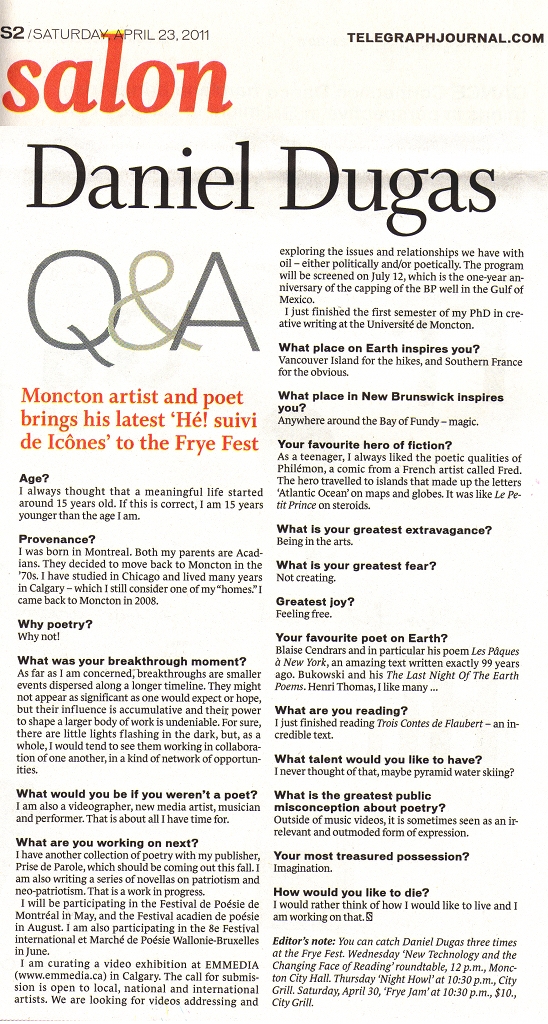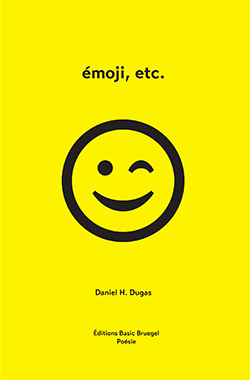Pleins feux sur les auteur-es de l’Atlantique (2021)
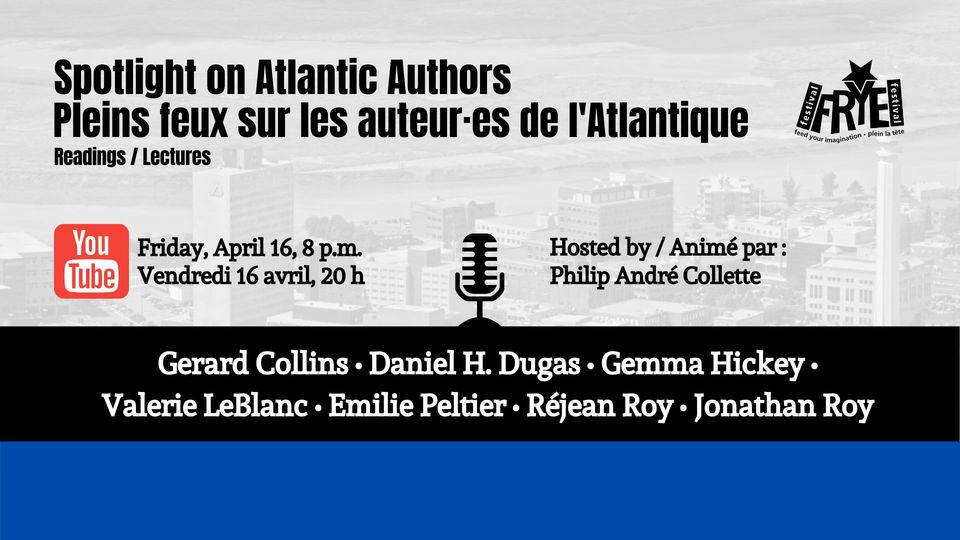
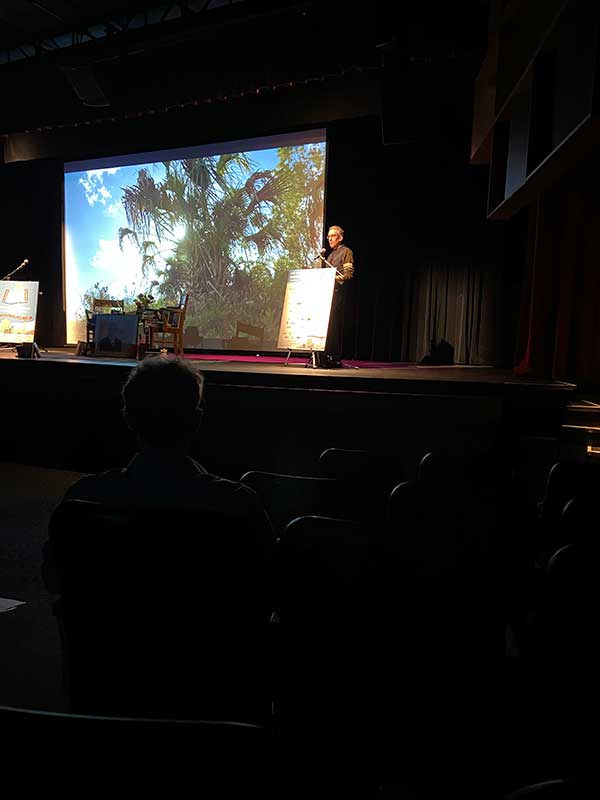
Le 16 avril, 20 h / Apr. 16, 8:00 p.m.
YouTube | Centre des arts et de la culture de Dieppe
Dieppe, 331 Av Acadie, Dieppe, NB E1A 1G9, Canada
Avec : Gerard Collins, Daniel H. Dugas, Gemma Hickey, Valerie LeBlanc, Emilie Peltier, Réjean Roy & Jonathan Roy • Animateur : Philip André Collette
Si la zone 1 (région de Moncton) est en phase JAUNE ou ORANGE , cet événement se déroulera en présence des artistes et devant le public, au Centre des arts et de la culture de Dieppe. Les places sont limitées et la salle peut accueillir des bulles d’au plus deux (2) personnes. L’accès est à contribution volontaire (à la porte).
Il sera également diffusé en direct sur notre chaîne YouTube (@FryeMoncton).
Afin de suivre les règles de santé provinciales, nous vous demandons d’indiquer les noms et les coordonnées de toutes les personnes de votre bulle.
An evening celebrating great successes in Atlantic Canadian literature over the past year. Be there as the 2021 Atlantic Book Awards finalists are revealed, and enjoy readings by winners of the Atlantic Book Awards, New Brunswick Book Awards, and Éloizes. Afterward, discover a short film titled Matin Ecchymose, which features a sign language performance of poetry by Mo Bolduc.
With: Gerard Collins, Daniel H. Dugas, Gemma Hickey, Valerie LeBlanc, Emilie Peltier, Réjean Roy & Jonathan Roy • Host: Philip André Collette
If Zone 1 (Moncton region) is at the YELLOW or ORANGE level, this event will feature live performances in front of an audience at the Dieppe Arts and Culture Centre. Seating is limited, restricted to bubbles of up to two (2) people. Admission is pay-what-you-can (at the door).
It will also be streamed live on our YouTube channel (@FryeMoncton).
In order to follow the provincial health regulations, we require you to indicate the name and contact information of all the people in your bubble.
Festival Frye Festival (2011)
Voici mon horaire pour le Festival :
le mercredi 27 avril à 12 h | Wednesday, April 27 at 12 PM
Les nouvelles technologies et les changements dans la pratique de la lecture
New Technology and the Changing Face of Reading
Daniel Dugas, Michael Happy, B.W. Powe, Serge Patrice Thibodeau
Moncton City Hall – Hôtel de ville de Moncton
PCQVP – PWYC
View Larger Map
le jeudi 28 avril à 22 h30 |Thursday, April 28, at 22 h 30
Night Howl –
Karen Connelly, Daniel Dugas, Musical Guest: Joe Grass
Cri nocturne – Karen Connelly, Daniel Dugas
Invité musical : Joe Grass
City Grill – - PCQVP-PWYC
le samedi 30 avril à 22 h 30 |Saturday, April 30 at 10:30 PM
Frye Jam
Hélène Dorion, Daniel Dugas, Doug Harris, Mark Anthony Jarman, Susan Juby, Dyane Léger, Shandi Mitchell
Animé par Les Païens with Joe Grass
Invités musicaux: Bernard Adamus, Phil Flowers, Viviane Roy
City Grill – $10
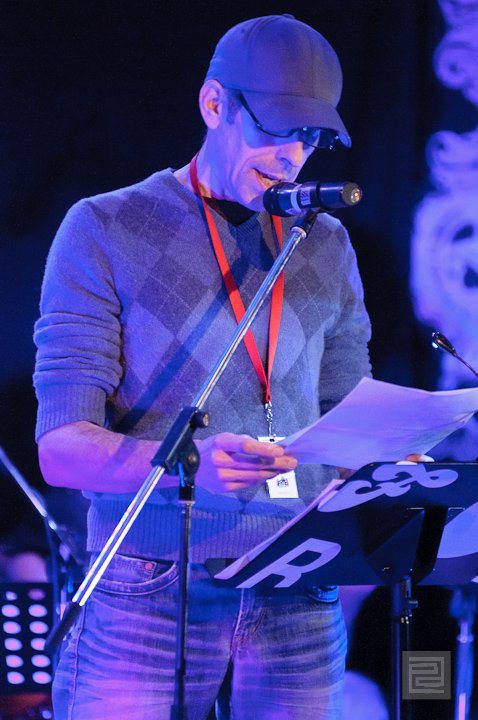
Horaire complet
Books: Frye Festival roundtable features Daniel Dugas, Michael Happy, B.W. Powe and Serge Patrice Thibodeau (2011)
by Shannon Webb-Campbell
For the Telegraph-Journal
Monday April 25th, 2011
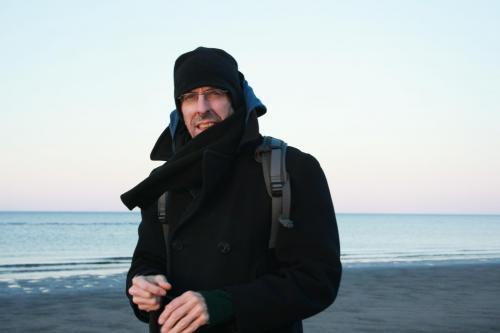
Writer Daniel Dugas says there’s a third dimension to a book that is hard to replicate in a virtual form.
Photo: Courtesy Valerie LeBlanc
Technology changes, but the written word remains the same.
Writers Daniel Dugas, Michael Happy, B.W. Powe and Serge Patrice Thibodeau host a roundtable discussion revolving around technology’s influence and effect on reading Wednesday at this year’s Frye Festival in Moncton.
“Physically we have developed a talent to read on small screens and to stare at bright lights for long periods of time,” says Dugas, a writer and new media artist. “We can even do that while walking or driving. Content is available 24-7, dressed up in all different suits at our fingertips.”
As a society we’ve become dependent on technology, addicted even. It’s most common to rely on e-readers, iPads, Kindles and reading newspapers, magazines and literature online. The advantage of technology resides in accessibility, documents are readily available that were once tucked away in libraries, research centres and universities.
“A book is a book is a book,” says Dugas. “There is a third dimension to the book that is hard to replicate in a virtual form. Our brains are good at that, feeling all of the dimensions. We have a spatial memory that enhances our reading, we take mental notes without even realizing it. Somehow we remember that a passage that we were trying to relocate in the book is on the bottom left or the top right.”
As a writer and publisher, Serge Patrice Thibodeau embraces technology yet firmly believes the bound and printed will persevere. In terms of history, the book is relatively new, being only 500 years old. At one point and time no one owned books. Every single book had to be handwritten and transcribed.
“Print will always be there. We will never abandon the book,” says Thibodeau. “When Life Magazine first started it was declared as the death of the book. People thought magazines would take the place of the book.
“The paper book will always remain, we don’t want to spend the rest of our lives in front of a computer or a screen. I think it would be too soon or fatalistic to predict the death of the book.”
Mohawk University professor Michael Happy adores books, though knows even his own reading has been influenced by technology’s shift. As a Frye scholar, he opens one of his 30-volume texts every day, though notes Google is a go-to quick reference.
“I’m a book person and I find myself like a water fly skittering from text to text,” says Happy. “It’s a big deal for me to sit down with a book, which I find I must take time to do.”
Happy believes it’s not the book that matters, it’s the literature. A culture is founded within its literature – imagination, storytelling and art. Long before the book, oral storytelling preserved culture. He says technology is altering our culture.
“The reason literature and all arts speak directly to us is the articulation of imaginative constants, the things that make us human,” he says. “These things are constant, the vernacular changes and sometimes the delivery changes, yet the human condition doesn’t change.”
Technology has changed the way we communicate. While language is fluid and continuously developing, the role of technology is changing our experience of it. Happy notices this most in the classroom.
“Our language is changing, you can see that in an awful lot of ways,” he says. “There is a vernacular, abbreviations, acronyms and all sorts of code that people speak and write to make the experience more efficient. These are very direct changes on the language. Is it a change for the worse? I don’t know.”
The Frye Festival roundtable New Technology and the Changing Face of Reading, featuring Daniel Dugas, Michael Happy, B.W. Powe and Serge Patice Thibodeau, takes place Wednesday at noon at Moncton City Hall. For information, visit www.frye.ca.
Questions & Answers
Interview with Shannon Webb-Campbell
How is technology changing the way we read?
I think it is fair to say that technology has changed the way we read and perhaps even what we read. Physically, we have developed a talent to read on small screens, to stare at bright lights for long periods of time. We can even do that while walking or driving. Content is available 24-7, dressed up in all kinds of different suits at our fingertips. We have become dependent and addicted to technology, sending shorter and shorter messages all the time.
One of the best things technology has done for reading is to have given voices to many people. I am thinking particularly of the rise of the blogs in the late 1990’s.
How are iPads, Kindles and e-readers influencing our reading? Are we reading less or are we reading more as a society?
I don’t know if we are reading more, but one thing is sure is that we are downloading a lot more. There are an enormous amount of public domain books available, on Feedbooks, Internet Archive, Amazon, the digital library Gallica, etc. E-readers make it easy to access them. The drawback in the public domain books is the number of mistakes, typos that can be found. It can be quite discouraging.
Is print dead?
This is not a new fear. In the mid-1800s when the French painter Paul Delaroche, saw his first Daguerreotype, he said that painting was dead. The power of representation of the photographic medium was scary for many painters, but we know that it was not the end. The same challenge exists now with print, but I believe that it will adapt.
Recently I interviewed Alberto Manguel, the world’s authority on the book. He says the production of the book has always been influx. Personally, he’d rather read the bound and printed (he does have a library boasting 35,000). What’s your take on the future of the book?
A book is a book is a book. There is a third dimension to the book that is hard to replicate in a virtual form. Our brains are good at that, feeling all of the dimensions. We have a spatial memory that enhances our reading when we read we take mental notes, without realizing it. Somehow we remember that a passage that we trying to relocate in the book is on the bottom left or the top right. I have a Kindle and I like it a lot, the electronic ink is just beautiful, but that does not take away from the feeling of holding a book. These are two different things and I think that is where the power of the book lies.
How does technology change our relationship to reading? What is the difference between reading something as a hard copy (in book form) versus on an e-reader?
Access to knowledge is probably the biggest advantage of technology; we can read books and documents that were inaccessible before. Depending the kind of reading, if it is exclusively e-books, that is great but when it comes time to annotate a book, I prefer to have the real thing. Keeping track of information can be challenging.
(I finished reading Manette Salomon a book from the brothers Goncourt, for a course at the Université de Moncton and I think it would have been difficult to keep track of my tabs in an e-book – see picture)
What is your opinion or prediction for the future of reading from a technological perspective?
It will accelerate and become even more pervasive.
What are the advantages to e-readers?
As stated by the marketers – portability. Read anywhere, save trees, etc.
How does technology influence and shape your own art?
I am a writer and a new media artist as well. My first encounter with a new technology (at the time when it was new) was in the mid-80’s with the MIDI protocol (Musical Instrument Digital Interface). I thought that it was fascinating and that the possibilities were endless! Basically, I have always seen technologies as enablers, as tools, and I continue to use them in that optic.
Moncton artist and poet brings his latest ‘Hé! suivi de Icônes’ to the Frye Fest (2011)
Age? I always thought that a meaningful life started around 15 years old. If this is correct, I am 15 years younger than the age I am.
Provenance? I was born in Montreal. Both my parents are Acadians. They decided to move back to Moncton in the 70′s. I have studied in Chicago and lived many years in Calgary which I still consider one of my “homes”. I came back in Moncton in 2008.
Why poetry? Why not!
What was your breakthrough moment? As far as I am concerned, breakthroughs are smaller events dispersed along a longer timeline. They might not appear as significative as one would expect or hope but, their influence is accumulative and their power to shape a larger body of work is undeniable. For sure there are little lights flashing in the dark but as a whole I would tend to see them working in collaboration of one another, in a kind of network of opportunities.
What would you be if you weren’t a poet? I am also a videographer, new media artist, a musician and a performer. That is about all I have time for.
What are you working on next? I am working in many fields at the same time. I have another collection of poetry with my publisher, Prise de Parole, and it should be coming out in the Fall 2011. I am also writing a series of novellas on patriotism and neo-patriotism. That is a work in progress. In terms of festivals I will be participating in the Festival de Poésie de Montréal, in May and the Festival acadien de la poésie in August. I am also participating in the 8e Festival international et Marché de Poésie Wallonie-Bruxelles in June.
I am curating a video exhibition at EMMEDIA in Calgary. The call for submission is open to local, national and international artists. We are looking for videos that address and explore the issues and relationships we have with oil, either politically and/or poetically. The program will be screened on July 12, 2011, which is the one-year anniversary of the capping of the BP well in the Gulf of New Mexico.
I just finished the first semester of my PhD in creative writing at the Université de Moncton.
What place on Earth inspires you and why? Vancouver Island – why – hikes, South of France, obvious.
What place in New Brunswick inspires you and why? Anywhere around the Bay of Fundy, magic.
Secret indulgence? Is this about products? Buying something like toys, eating something like chocolate? Why is it secret anyway. The concept lost on me.
Your favourite hero of fiction and why? None currently but as a teenager, I always liked the poetic qualities of Philémon, a comic from a Belgium artist called Fred. The hero travelled to islands that made up the letters ‘Atlantic Ocean’ on maps and globes. It was like Le Petit Prince on steroids.
What is your greatest extravagance? Being in the arts.
What is your greatest fear and why? Not creating.
Greatest joy? Feeling free.
Your favourite poet on Earth and why? I like many. Blaise Cendrars and in particular his poem : Les Pâques à New York, an amazing text written exactly 99 years ago. Bukowski and his Last Night Of The Earth Poems, Henri Thomas…
What are you reading? I just finished reading Trois Contes de Flaubert – incredible text.
What’s on your iPod? I don’t have an ipod, I have something else with Mexican Music, Boucabar.
What talent would you like to have? I never thought of that, maybe pyramid water skiing?
What is the greatest public misconception about poetry? Outside of music videos, it is sometimes seen as an irrelevant and outmoded form of expression.
Your most treasured possession? Imagination.
What is your motto? I don’t have one.
How would you like to die? I would rather think of how I would like to live and I am working on that.
Editor’s note: You can catch Daniel Dugas three times at the Frye Fest. Wednesday ‘New Technology and the Changing Face of Reading’ roundtable, 12 p.m., Moncton City Hall. Thursday ‘Night Howl’ at 10:30 p.m., City Grill. Saturday, April 30, ‘Frye Jam’ at 10:30 p.m., $10., City Grill.
Daniel H. Dugas
Archives
Blogroll
- A.I.R. Vallauris
- ACAD
- Adobe additional services
- Adobe Creative Cloud
- AIRIE
- Amaas
- Amazon Author Central
- ARTothèque
- Australian Poetry
- Basic Bruegel
- Bitly
- CCCA
- CDBaby
- Cycling 74
- Dissolution
- Éditions Prise de parole
- Emmedia
- eyelevelgallery
- FAVA
- Festival acadien de poésie
- Festival FRYE Festival
- FILE – Electronic Language International Festival
- Freeware list
- Fringe Online
- Galerie Sans Nom
- Gotta Minute Film Festival
- Instants Vidéo
- JUiCYHEADS
- Kindle Direct Publishing
- Klondike Institute of Art and Culture
- La Maison de la poésie de Montréal
- La Maison de la Poésie et de la Langue française Wallonie-Bruxelles
- Laboratorio Arte-Alameda
- Le Centre Jacques Cartier
- Liberated Words
- Maison Internationale de la Poésie – Arthur Haulot
- MediaPackBoard
- Miami Book Fair International
- Monoskop
- Mot Dit
- NSCAD University
- Paved Arts
- PoetryFilm
- Portail des auteurs du Nouveau-Brunswick
- RECF
- Revue Ancrages
- Salon du Livre du Grand Sudbury
- Sculpture Space
- Subtropics.org
- Sydney college for the arts
- The Centre for Contemporary Canadian Art
- The New Gallery
- Trevigliopoesia
- tumbler-documents
- V Tape
- Valerie LeBlanc
- VideoBardo
- Void Network-Κενο Δίκτυο
Categories
- #covidpoèmes
- Advertisement
- AIRIE
- Ancrages
- anthology
- Anthropocene
- Architecture
- Around Osprey
- art
- Article de presse
- arts visuels
- audio
- Australian Poetry
- Basic Bruegel Editions
- Book
- book fair
- Cafe Poet Program
- Ce qu'on emporte avec nous
- Citations gratuites
- Collaboration
- commentaire
- commentary
- Compte rendu
- conférence
- Conservation Foundation of the Gulf Coast
- COVID-19
- Critique littéraire
- culture
- Daniel Dugas
- Design
- Édition Michel-Henri
- Éditions Perce-Neige
- Éloizes
- Emmedia
- emoji etc | émoji etc
- Environnement
- essai
- essay
- Everglades
- Exhibition
- festival
- Festival acadien de poésie
- Festival Frye Festival
- FIPTR
- Flow: Big Waters
- Fundy
- Habitat
- installation
- Instants Vidéo
- interactivity
- journal
- JUiCYHEADS
- Kisii
- L'Esprit du temps
- laptop
- Leaving São Paulo
- lecture
- Livre
- logos
- Magazine
- Miami Book Fair
- Moncton 24
- novel
- OASIS
- oil spill
- perception
- performance
- Photo
- poésie
- Poetic Licence Week
- Poetry
- politics
- politique
- press
- Prise de parole
- Revue Ancrages
- salon du livre
- sculpture
- Sculpture Space
- sound
- Souvenirs
- Spirit of the Time
- Style & Artifacts
- Symposium d'art/nature
- talk
- television
- The New Gallery
- Uncategorized
- Valerie LeBlanc
- vidéo
- vidéopoésie
- Videopoetr/Vidéopoésie
- videopoetry
- visual arts
- What We Take With Us
- youth literature







